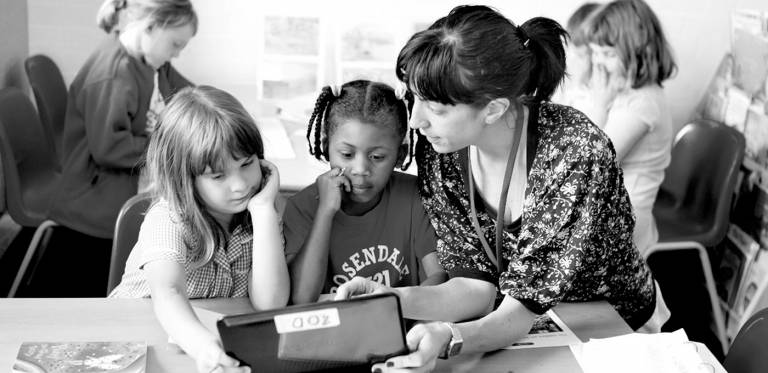Connecting Knowledge Lesson Study Project

26 January 2017
Led by Rosendale Primary School, the project was developed in partnership with IOE and aimed to test whether our model of lesson study could improve teacher subject knowledge and have impact on pupil learning. For the first two years of the project, the subject-focus was mathematics, it is currently focused on writing. The project is funded by the London Schools Excellence Fund and so far 26 schools have been involved.
Challenge
Across Lambeth Local Authority, attainment in mathematics was falling behind literacy for the most vulnerable at the end of key stage 2. This project aimed to address that underperformance and improve outcomes for all learners. The lesson study process in this project focuses specifically on vulnerable and / or underachieving groups of children.
The second phase of the project has now begun and intends to apply the same lesson study implementation and evaluation model to the teaching of writing.
Solution
Research suggested a Japanese approach to professional learning for teachers called lesson study could have a powerful impact on learners. Lesson study involves repeat cycles of the below stages:
- the identification of a research focus through an analysis of data;
- collaborative lesson planning by a small group of teachers;
- a research lesson, in which one member of the planning group teaches and all teachers in the group observe the lesson;
- a post-lesson discussion to draw out learning in relation to the research focus.
This project aimed to mobilise knowledge across the network of engaged schools through ‘open house’ lesson study, where teachers visited research lessons in other schools. It also aimed to build leadership capacity across the network of engaged schools, by providing professional learning for a group of Lead Teachers for lesson study.
The role of IOE as ‘expert’ other was crucial to the success of the project. The IOE consultants brought expertise around both mathematics and lesson study. Experts worked alongside lead teachers to find ways both to co-construct a lesson study model and to develop subject expertise in response to schools’ needs.
The IOE also worked with participating teachers to design and pilot a set of evidence-based, robust impact analysis tools that would capture impact at teacher and pupil level.
Results and impact
Well facilitated lesson study sessions led to insightful observations of pupils’ learning that sometimes challenged teachers’ own pre-conceptions about particular pupils they taught. The extra pair of eyes in the class and detailed post-lesson discussions meant that high quality lessons were planned and subsequently improved in relation to their effect on pupils’ learning. The supportive lesson study groups helped to encourage risk taking and innovation in the majority of participants. Independent assessments of lesson study processes revealed a high quality of engagement with the core philosophy of lesson study (focusing on pupil learning).
Highly significant shifts were shown in teachers’ pedagogical skills. Teacher self-evaluations on nine aspects of pedagogy showed significant shifts in eight of them. Large effect sizes were seen for skills in: considering pupil voice; thinking about longer term learning goals; building on pupils’ prior learning; developing higher order skills, embedding assessment for learning and inclusivity. These results suggest that the lesson study process has helped teachers to reflect on a wide range of subject pedagogy that is likely to have benefitted pupils they teach outside of their target group and also those they will teach mathematics to in the future. In relation to their target pupils, teachers reported a range of gains, in particular how to attend to the needs of these pupils and how to break down learning into manageable steps.
Attainment of focus pupils increased significantly in both years of the project. Teachers set aspirational targets for these pupils, not just to bring their rate of progress up to the average, but to accelerate this and attempt to bring often struggling students up to the level of their classmates. Teacher assessments of achievement showed that these attainment targets were met in a large number of focus pupils and these reached very high levels of statistical significance. Qualitative analyses showed numerous examples of pupils developing number skills and mastering problem solving strategies. Pupils were also more able to articulate their learning process while solving mathematical problems. In addition, many teachers remarked on the increase in focus pupils’ confidence, collaboration in learning tasks, resilience and perseverance.
 Close
Close

